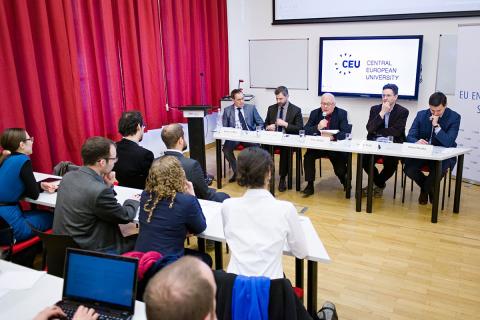"Energy and Security in Ukraine: Implications for Europe and the West"

On February 17, 2015 the Center for EU Enlargement Studies organized an expert roundtable entitled ‘Energy and Security in Ukraine: Implications for Europe and the West’ in cooperation with the US Embassy in Budapest. Panelists discussed the current situation in Ukraine, focusing on four key areas: energy security, Western-Russian relations, hard security concerns in Ukraine and the United States’ position on the conflict.
In his opening remarks, Prof. Péter Balázs, director of CENS, drew attention to the global importance of the Ukrainian crisis, as well as to the topicality of the conference, organized on the day of Russian President Putin’s visit to Budapest. In his introductory speech, Mr. Robert J. Riley, Acting Deputy Chief of Mission, US Embassy, summarized the United States’ official position on Ukraine, emphasizing that the US finds Russia’s violation of Ukraine’s sovereignty, territorial integrity and its disregard of international law that guarantees these unacceptable. He maintained that it is difficult in these times to strike a lonely path: both the US and the EU have decided to firmly oppose Russia’s conduct. Acknowledging that Ukraine has been far from perfect even before the crisis, the US interested in what Ukraine can be. The Minsk negotiations offer some hope in the resolution of the conflict, but if they were to fail, appropriate measures—including further sanctions—will have to be taken.
In his contribution to the panel discussion Prof. Balázs highlighted the problems of European-Russian relations. The EU’s Eastern Partnership is largely in shambles, with Ukraine as the only remaining key partner. However, the EU itself is not unified about the treatment of the crisis. Meanwhile, Russia’s aspirations are unclear: are Belarus and Armenia are the only European parts of the Eurasian Union, or should there be more that Moscow wants to draw in? There are several frozen conflict in this part for Europe, Balázs noted, but only the annexation of Crimea really challenged the post-world order. Now it is clear that we are facing a “New World Order”, but it is not at all clear what role Russia should play in it. Closing his presentation, Prof. Balázs suggested that at some point in the future, Europe will need a new Helsinki accord to stabilize the continent.
Dr. András Deák, Senior Research Fellow at the Institute of World Economics, HAS, focused his contribution on energy security. He emphasized that Ukraine is an extremely poor country and its use of energy is far from efficient. The country has the same GDP as Hungary—a much smaller state—yet it spends a much larger percentage of its GDP on energy. Therefore energy will play a crucial role in the management of the conflict. What lends special novelty to the crisis is that on the one hand the war in Eastern Ukraine has not stopped energy flows, and on the other hand the West took responsibility in Ukraine’s economic stabilization, including covering gas costs. However, Europeans may not realize that this is a long term commitment of considerable resources. With regards to sanctions Deák acknowledged that they were a necessary step as they represent the only effective way the West can put pressure on Russia. Though they are effective in disrupting Russia’s economy, in the long run they might lead to further problems as an isolated Russia with a stagnating economy and extreme nationalism might present further risks to the security of the continent.
Mr. Dániel Bartha, Executive Director of the Centre for Euro-Atlantic Integration and Democracy, discussed the wider security aspects of the Ukrainian crisis. Acknowledging the importance of the progress at the recent Minsk negotiations he highlighted that the accord only dealt with heavy weaponry. Other weapons not covered by the negotiations may still represent a threat to security: they might end up in other conflict zones or with criminal organizations through the black market. Meanwhile the conflict might become frozen, essentially offering Russia veto powers on constitutional reforms in Ukraine. Decreasing the intensity of the conflict therefore is in Russia’s interest, also because of its mounting costs. At the same time, Europe is far from unified about Ukraine and Russia. Variations in dependencies may lead to further ruptures within the EU along the East-West axis, but also within Central and Eastern Europe.
The panel discussion was closed by the discussant, Mr. Timothy Shriver from the US Embassy, who reiterated US commitment to sanctions and a united Western stance on the conflict.
